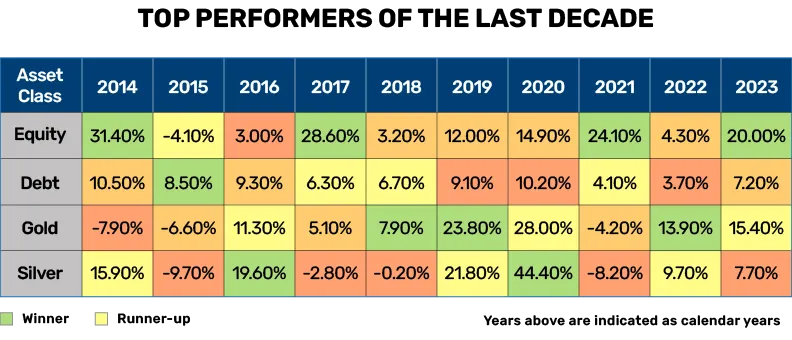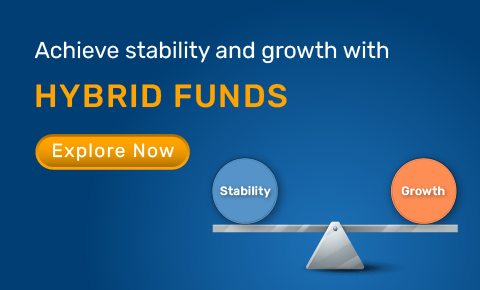Hybrid Mutual Funds
Bajaj Finserv Multi Asset Allocation Fund
Hybrid Fund Regular GrowthBajaj Finserv Balanced Advantage Fund
Hybrid Fund Regular GrowthBajaj Finserv Arbitrage Fund
Hybrid Fund Regular GrowthWhat are hybrid funds?
Hybrid mutual funds are diversified investment vehicles that invest in both equity and debt securities. They seek to offer investors a balanced approach to investing that combines the growth potential of equities with the relative stability of debt investments.
There are multiple hybrid mutual fund categories in India, each with a different equity-debt ratio.
How do hybrid funds work?
Hybrid mutual funds seek to balance risk and reward potential by diversifying across debt and equity. Equities offer the potential for significant capital appreciation in the long term. Meanwhile, debt offers lower return potential but is typically less volatile than equities.
Moreover, these two asset classes typically have a low correlation, meaning that they respond to market trends differently. So, when equities are surging, debt may be less attractive. Similarly, during a downturn, the prices of equities may fall, but debt may lend relative stability to the portfolio.
In this way, hybrid funds seek to combine the benefits of two or more asset classes in a single scheme, which can help it navigate different market conditions.
Types of hybrid mutual funds
There are several hybrid mutual fund types in India, each with different portfolio compositions and investment strategies. Here’s a comprehensive list:
- Aggressive hybrid funds: Invest a minimum of 65% of their assets in equities and at least 20% in debt.
- Balanced hybrid funds: Maintain a balance between equity and debt investments, with a minimum 40% and maximum 60% allocation to each asset class.
- Conservative hybrid funds: Primarily invest in debt instruments (75% of their portfolio) with at least 10% in equities.
- Dynamic asset allocation funds: Portfolio is dynamically managed between debt and equity. Fund managers can choose an asset allocation pattern based on their investment objectives and strategy and can alter the allocation in response to market movements.
- Multi-asset allocation funds: Invest in debt, equity, and at least one other asset class, such as gold or real estate, with a minimum allocation of 10% in each.
- Arbitrage funds: Invest primarily in arbitrage opportunities offered in equity and equity-related assets.
- Equity savings funds: Invest in equity, debt, and arbitrage opportunities, with a minimum of 65% equity allocation and a minimum of 10% in debt.
Note: A fund house can offer either an aggressive hybrid fund or a balanced hybrid fund.
Who should invest in hybrid funds?
Hybrid funds are suitable for investors seeking portfolio diversification and a balanced investment strategy. This may include:
- New investors: By investing in a mix of equities, debt, and sometimes other assets, hybrid funds help investors access a diversified portfolio without having to manage multiple funds. This can make such funds suitable for first-time investors.
- Investors seeking to balance risk and reward potential: Investors who want the growth potential of equities as well as the relative stability of debt instruments can consider investing in hybrid mutual funds.
- Investors with a medium to long-term horizon: Those with a medium to long-term investment horizon can benefit from the long-term growth potential of equities and the relative stability of debt in hybrid funds.
How should you invest in a hybrid mutual fund?
To invest in a Bajaj Finserv AMC hybrid mutual fund, follow these steps:
- Browse the website and select a scheme
- Click on ‘Invest Now’ from the scheme page or the website home page. You will be redirected to the investor portal.
- Log in if you are an existing investor, or else sign up. To sign up, you will need to enter some basic information such as your name, date of birth, PAN details, and bank account information. You may also be asked to complete your Know Your Customer (KYC) verification process if you are not KYC validated.
- From the dropdown menu, select the scheme you wish to invest in and the mode of investment (lumpsum or SIP). Enter the investment amount and select the payment method.
You can also invest online as well as offline through your distributor or through aggregator platforms.
Features and benefits of hybrid funds
Diversification: Hybrid funds invest in a mix of asset classes, potentially mitigating overall portfolio risk.
Potential for growth: The equity portion of a hybrid portfolio provides opportunities for potential capital appreciation over the long term.
Reduced volatility: Debt securities provide relative stability and potential for income generation.
Ease of investment: Investors can start with a relatively small amount through a systematic investment plan (SIP).
Variety: Hybrid funds come in various types. Some are equity-oriented, some are debt-oriented, and some are evenly spread between the two asset classes. This allows investors to choose a fund that matches their risk tolerance and investment goals.
Risk management: By combining different asset classes, hybrid funds seek to potentially manage risk and optimise returns.
How to Pick the Right Hybrid Mutual Fund
Here are some steps investors can take to decide where to invest:
Assess your risk tolerance: Equity-oriented hybrid funds are suitable for investors with higher risk tolerance, while debt-oriented ones suit conservative investors.
Define your goals: Identify your financial goals, such as wealth creation, regular income, or relative stability of capital, and your investment horizon. This will influence the equity-debt mix that is suitable for you.
Examine asset allocation: Based on these parameters, look at the fund's asset allocation strategy to select one that is suited to your requirements. Conservative investors or those seeking low volatility may prefer balanced or conservative hybrid funds. High-risk investors can opt for aggressive hybrid funds. Several balanced advantage funds and multi-asset allocation funds may also have an equity-oriented portfolio.
Check fund manager details: Look at the track record and experience of the fund manager, especially for dynamically managed funds.
Review risk assessments: Assess the fund’s risk metrics, such as standard deviation and beta. These indicate the fund’s volatility and sensitivity to market movements.
Tax implications of hybrid mutual funds
The taxation on hybrid mutual funds depends on the equity-debt ratio of the scheme and the holding period. The tax rates as per Union Budget 2024 are as follows:
- Equity-oriented hybrid funds (65% or more equity allocation):
- Short-term capital gains tax: Applicable on units held for less than a year. The tax rate is 20%, with no exemptions.
- Long-term capital gains tax: Capital gains on units held for more than a year are taxed as long-term capital gains. Gains of up to Rs. 1.25 lakh in a financial year are tax-exempt. Thereon, the tax rate is 12.5%
- Debt-oriented hybrid funds (less than 35% equity allocation)
- Starting April 2023, all gains from debt-oriented funds are deemed short-term capital gains regardless of the holding period and are taxed as per the investor’s applicable income tax slab rate.
- Hybrid mutual funds with more than 35% but less than 65% equity allocation:
- Short-term capital gains tax: Applicable on units held for less than 24 months. Capital gains are taxed as per the investor’s income tax slab.
- Long-term capital gains tax: Capital gains on units held for more than 24 months are considered long-term capital gains and taxed at 12.5%
Learn About Mutual Funds

Investing isn’t just about numbers,…

In today’s fast-paced consumerist…

When markets fluctuate significantly…

Gold has traditionally been used in…

Image for representation purposes…

Gold often draws attention when…

Of the almost 4 crore unique…

Traditional wisdom in the mutual…

Retail investors predominantly…

A common question among investors is…

Equity, debt, gold, and silver have…

Recently, at a bustling farmers’…

Walk into your closet and take a…

You may not realise it, but when you…

Over the years, mutual funds have…

Planning for retirement involves…

Securing a comfortable post-…
Frequently Asked Questions
Hybrid funds offer diversification by investing in both stocks and debt instruments, which can combine the potential for long-term capital appreciation with risk mitigation.
Debt mutual funds invest predominantly in bonds, money market instruments and other fixed income securities. Hybrid funds, on the other hand, typically invest in both debt and equity instruments.
Market risk – including volatility, economic downturns, sector-specific trends, and interest rates – affects both equity and debt portions of hybrid funds to varying degrees and can impact returns. Asset allocation risk can arise if the fund’s mix doesn't align with market conditions and a hybrid portfolio may offer lower returns than pure equity funds in certain market conditions. Additionally, underperformance or poor decision-making by fund managers can affect portfolio returns.
A balanced hybrid fund is a type of hybrid mutual fund. Balanced hybrid funds almost evenly spread their assets between debt and equity. They must invest a minimum of 40% and maximum of 60% in each asset class.
No mutual fund is completely safe. Hybrid funds do not offer fixed or guaranteed returns and there is no assurance of capital safety. However, such funds seek to mitigate risk through diversification. Debt-oriented hybrid funds may carry lower risk than equity-heavy ones.
You can invest in hybrid mutual funds in several ways. You can invest either online or offline through the following avenues, among others
- Directly through the asset management company
- Through a registered mutual fund distributor
- Through an aggregator
- Through the Registrar and Transfer Agent
The fund type that is suitable for you depends upon your risk appetite, goals and investment horizon. Hybrid mutual funds seek to combine the return potential of equities with the relative stability of debt investments. However, the risk level depends on the equity-debt ratio of the scheme. Equity funds, meanwhile, may offer higher growth potential in the long term, albeit with greater risk.
Mutual Fund Videos: Watch, Learn, Invest

While conventional wisdom suggests…
While conventional wisdom suggests…
While conventional wisdom suggests…

